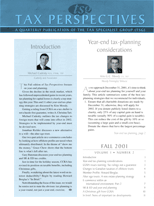
PDF Format
 Issue Contents Issue Contents
 All Issues All Issues
Fall 2001
Volume 1, Number 2
The information in Tax Perspectives is prepared for general interest only. Every effort has been made to ensure that the contents are accurate. However, professional advice should always be obtained before acting and TSG member firms cannot assume any liability for persons who act on the basis of information contained herein without professional advice.
E-Commerce Within an International Environment: Part 2
By Grace Chow, CA, TEP
Cadesky and Associates LLP (Toronto)
In part 1 of this article, we reviewed the issues to consider when structuring an e-commerce-based business within an international environment. In part 2, we review how profits may be withdrawn from these structures.
WEBSITECO OWNED BY CANADIAN PARENT
We will first look at a situation where the parent company is located in Canada. Our typical scenario is illustrated in figure 1. Websiteco earns active business income from selling goods and services to international and Canadian customers who order over the Internet. Under this business structure, consider the following: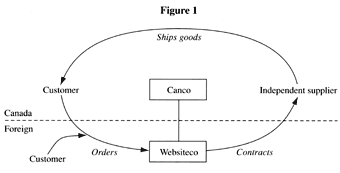
- Is the income of Websiteco truly active income or can it be deemed to be foreign accrual property income (FAPI)? If FAPI, Websiteco's income will be taxable to Canco as earned by Websiteco.
- How is the income taxed when it's distributed to Canco?
- What are Canco's reporting requirements?
Foreign accrual property income
The income of Websiteco will be considered FAPI if
- Websiteco earns income from property or
- Websiteco is deemed to carryon a non-active business.
Income from an active business (such as the sale of property or the provision of services) generally is not income from property. Royalty income (such as income based on usage), however, is income from property. In the e-commerce world, it is not always simple to distinguish royalty income from income from an active business. It is important, then, to analyze the nature of Websiteco's income. Strangely, Websiteco can be deemed to be carrying on a non-active business when it makes sales of goods produced in a country other than the one where Websiteco is located to a related Canadian company. There is, however, an exception to this rule if more than 90% of the gross revenue of Websiteco is derived from sales to arm's-length parties.
Repatriating income to Canada
Assuming that Websiteco earns income from an active business, we must now consider the tax implications of bringing the earned income back to Canada. This will depend on whether Websiteco is resident in a treaty or a non-treaty country.
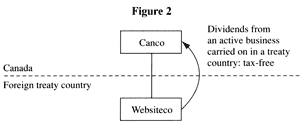 Websiteco in a treaty country Websiteco in a treaty country
If Websiteco is resident in and carries on business in a country with which Canada has a tax treaty, Websiteco's income from an active business may be repatriated to Canco without tax. (See figure 2.)
Recall from part 1 of this article that the Web site itself is not considered a permanent establishment. To have a permanent establishment in a treaty country, there must be an office where income-generating activities occur.
The income earned from the business carried on in the treaty country may be subject to tax there. Dividends paid may be subject to withholding tax by the treaty country. No relief is given by Canada for these taxes, because the dividend itself is not taxable.
Websiteco in a non-treaty country
If Websiteco is resident in or carries on business in a non-treaty country, income from an active business will be taxable to Canco when repatriated to Canada. Certain deductions are allowed for foreign income taxes and withholding taxes paid by Websiteco.
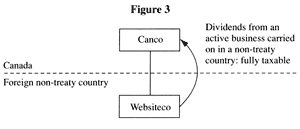 If Websiteco is located in a non-treaty country, chances are that this country will be a tax haven. Websiteco will pay little or no tax in that country, nor will it be subject to withholding tax. Therefore, the dividend paid from Websiteco's active business will be fully taxable in Canada. (See figure 3.) If Websiteco is located in a non-treaty country, chances are that this country will be a tax haven. Websiteco will pay little or no tax in that country, nor will it be subject to withholding tax. Therefore, the dividend paid from Websiteco's active business will be fully taxable in Canada. (See figure 3.)
If a non-treaty country is to be used, it will generally be better to own Websiteco through a foreign corporation, as discussed below.
WEBSITECO OWNED BY FOREIGN PARENT
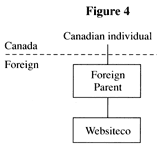 We now consider the business structure in which Websiteco is a wholly owned subsidiary of a foreign corporation. (See figure 4.) We now consider the business structure in which Websiteco is a wholly owned subsidiary of a foreign corporation. (See figure 4.)
If dividends are paid by Websiteco to Foreign Parent, these dividends will not be taxable to the Canadian resident as long as funds are left in Foreign Parent. This is a useful structure for the long-term deferral of taxes.
If funds are taken out of Foreign Parent as dividends, they will be fully taxable. If, however, shares of Foreign Parent are redeemed, this will yield a capital gain taxable at a 50% rate.
REPORTING REQUIREMENTS
Under any of the possible business structures, the Canadian- resident shareholder must file form T1134B in respect of a controlled foreign affiliate. Under the scenarios illustrated in figures 1 to 3, Canco will file in relation to Websiteco. Under the scenario illustrated in figure 4, the Canadian individual shareholder will file in relation to Foreign Parent and Websiteco.
Form T1134B is due 15 months after the year-end of the reporting taxpayer. For example, if Canco has a March 31 year-end, then form T1134B for March 31, 2001 will be due on June 30, 2002.
CONCLUSION
This article has illustrated some of the tax issues on repatriating income from an e-commerce offshore company. Interested readers can visit our Web site for more information.
|